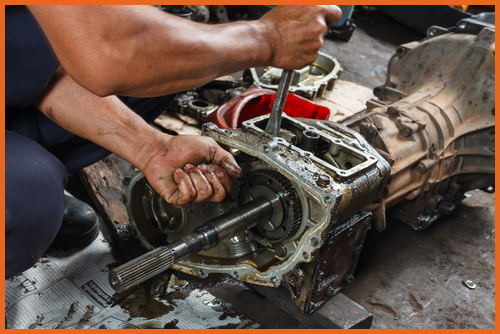What Does It Mean If Your Transmission Is Slipping?
Your transmission serves the purpose of ensuring the proper amount of power goes to your wheels to drive at the desired speed. The teeth of the transmission’s gears operate similarly to the gears on a multi-speed bicycle.
“Transmission slipping” is in reference to when your transmission shifts into a gear without corresponding to its current speed. A slipping transmission can be troubling at best and a safety hazard at worst. It is a clear indicator that your car needs some maintenance.
Your transmission slipping can be caused by a myriad of issues ranging from low fluid levels and leaks to worn out gears or solenoid problems.
At the end of the day, it presents a danger because a slipping transition can lead to accidents (and further damage to the transmission altogether).
Signs Of Transmission Slipping
It’s important to recognize the warning signs of a transmission slipping. A few signs include:
- Engine chugs or revs without igniting
- Slow, weak or delayed acceleration
- Difficulty shifting gears or hard shifting
- Grinding, whining or other strange noises
- Won’t go in reverse
- Burned or strange smells
- Check engine light
When your transmission slips, you may feel the vehicle is sluggish or slow to respond.
In some instances, it won’t respond at all after pressing the gas pedal. You may also hear an audible whine or change in the pitch as it changes gears.
As stated previously, it is unsafe to drive with a slipping transmission and you should get your vehicle to a mechanic ASAP.
Furthermore, if your vehicle begins to shake or becomes increasingly difficult to control, you should pull over.
Our expert evaluators can help you get an accurate estimate for your cars value, FAST!

Why Is Your Transmission Slipping?

Your transmission grinding, slipping, or otherwise making loud, uncomfortable sounds, most likely means it is experiencing one of the following:
- Low, worn out or burned transmission fluid is the most common cause of transmission issues. It’s imperative to check your transmission fluid levels and maintain them at manufacturer recommended levels. If your car seems sluggish, check your transmission fluid and get a fluid flush if necessary.
- Solenoid problems can be the culprit of transmission issues. The solenoid is an electromagnetic component in charge of controlling the flow of fluid within your transmission. When gears shift, your car’s Engine Control Module engages the solenoid, pushing transmission fluid into the valve to activate the correct gear. The transmission solenoid regulates the amount of fluid passed through during this entire process. Without it, too little fluid might cause overheating and slipping.
- Worn or broken transmission bands can cause a transmission to slip because the bands are what links the gears together in an automatic transmission. They must engage and release in precise increments in order to maintain peak performance. While bands or clutch plates might only need an adjustment, the lack of transmission fluid can cause them to become worn or burned throughout the transmission and in the torque converter.
- Clutch problems can arise from a lack of clean transmission fluid being pumped through at the precise time with the right pressure to shift the gears. Automatic vehicles have a torque converter, but the same wear and tear can occur for the same reason.
- Worn out gears are the result of low or burned out fluid. The wear on tear on the gears over time will cause them to slip and not engage properly. You may even feel the bumpy shift and slippage when you try to accelerate your vehicle.
- Torque converter issues do plenty of heavy lifting within your transmission. This makes it susceptible to wear and tear and, like other parts of the transmission, it requires fluid in the right amounts to flow over it at the right time. If this fluid flow fails to happen, the transmission will begin slipping.
How Much Does It Cost To Repair A Slipping Transmission?
A slipping transmission can be one of the most costly repairs to make, generally speaking. If the cause of the slippage is just a matter of being low on fluid, then purchasing $5 to $15 worth of fluid can solve your problem.
Replacing your transmission altogether, however, will cost an average of $2,800.
- Replacement ranges from $1,400 to $5,800 depending on its year/make/model.
- If electronics are at fault for the slippage, the repair can cost about $800, labor included.
- Rebuilding your transmission (instead of outright replacement) costs an average of $1400.
Ultimately, you have to fix your transmission if you intend to keep driving that car.
However, repairing the transmission may not be an option that is fiscally feasible for you. That’s where DamagedCars steps into the picture.
How To Sell A Car With A Damaged Transmission
DamagedCars specializes in taking less-than-perfect cars off their owner’s hands. A slipping transmission might be a hassle for you to fix, but it’s the perfect fit for DamagedCars.
Our entire process is as simple as 1-2-3:
Step 1: Get your free quote! Simply enter some basic information about your car on our website and you’ll receive a free and guaranteed quote within 90 seconds.
Towing is complementary, so you’ll never have to worry about hidden or additional fees taking away from the profits you take home.
Step 2: Schedule your pickup within 24-48 hours! If you’re happy with your quote, you’ll be able to schedule your vehicle retrieval with one of our partners within your area. They’re trusted to come to you at a time that works best for you.
Step 3: Complete your sale! After a quick inspection and transferring of your title, you’ll receive the amount you were quoted, no haggling or fuss. Your vehicle is taken off your hands and money is put in them!
Contact DamagedCars today and worry about what to do when your transmission is slipping no more!



